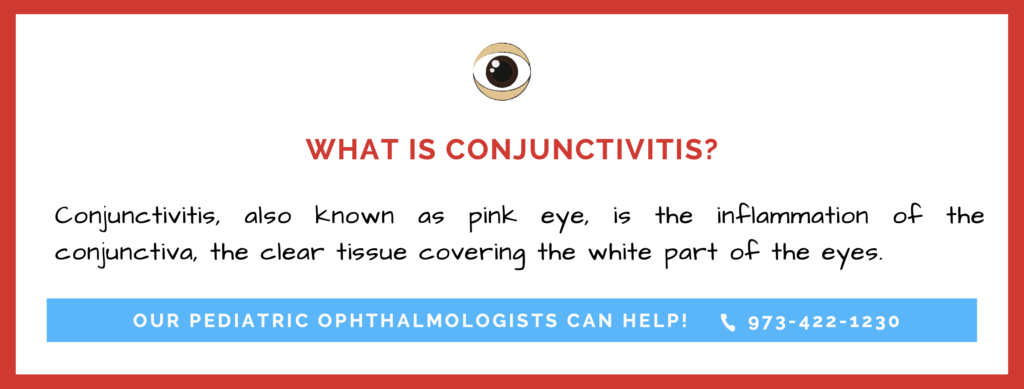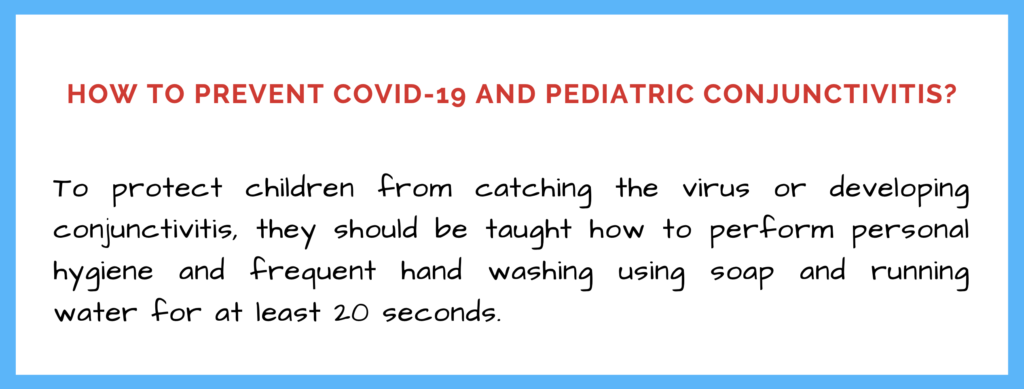Conjunctivitis, also known as pink eye, is the inflammation of the conjunctiva, the clear tissue covering the white part of the eyes. It becomes red or swollen when it is infected, irritated, or inflamed due to a bacteria or virus.
Pink eye has been detected as an uncommon symptom in a small number of children positive for COVID-19, according to The Lancet. In one case in China, a 2-year-old boy developed conjunctivitis and eyelid dermatitis seven days after testing positive for the virus. Furthermore, a case study involving five children has revealed that conjunctivitis may be the only sign and symptom of an active COVID-19 infection in children and that they may not develop respiratory symptoms at all.
How COVID-19 gets in the eyes
Our pediatric eye doctor explains that since the novel coronavirus travels in droplets in the air after someone coughs, sneezes, speaks, or laughs, it’s easy for the children to catch the virus if they inhale these droplets. It’s also possible to acquire the virus if children rub their eyes or nose after touching contaminated surfaces.
Pink eyes may easily develop when the virus reaches the eyes because the novel coronavirus has similar genetic makeup as the flu and the SARS virus. Experts also suspect that the virus may be transmitted through the eyes since children with conjunctivitis have increased secretion in the eyelids.
Preventing COVID-19 and pediatric conjunctivitis
To protect children from catching the virus or developing conjunctivitis, they should be taught how to perform personal hygiene and frequent hand washing using soap and running water for at least 20 seconds. If a water source is not available, the Centers for Disease Control and Prevention (CDC) recommends using alcohol-based hand rubs with at least 60% alcohol content. Parents should also teach their children to:
- avoid rubbing their eyes, especially if they haven’t washed their hands
- avoid touching their face
- practice physical distancing when in a public place
- avoid crowded places
- wear a protective mask and a face shield if going out
Symptoms to watch out for
According to our pediatric ophthalmologist in NJ, pink eye symptoms typically include redness, itchiness, sensitivity to light, and eye discharge on one or both eyes. The child may also have increased tearing of the eyes. If the child has coronavirus, these symptoms may also be accompanied by fever, dry cough, and fatigue.
If the child has been exposed to a COVID-19 positive person and then presents these symptoms, it’s best to see a doctor to get tested. The child may also have to be isolated from other family members at home to prevent any virus transmission.
While conjunctivitis can be very uncomfortable, it is curable with antibiotics or antiviral medications. The child also has to rest the eyes, which means no reading, watching television, or using phones or electronic devices for the time being.
Learn more about conjunctivitis from our pediatric eye doctor
Our exceptional doctors, Amy Lambert, MD, and Rachel Bloom, MD, are both board-certified pediatric ophthalmologists. Dr. Lambert, the founder of Pediatric Eye Associates, LLC, is also a board-certified strabismus surgeon, and Dr. Bloom is additionally fellowship trained.
Our pediatric eye doctors are experts at meeting your children’s eye and vision needs. We pride ourselves on the results we achieve with our patients, and we believe the key is not just our medical expertise, but also attitude and patience with the children. Our motto is “to provide the highest quality eye care for children in a setting that is comfortable and reassuring.”
We understand that you will have many questions about our Livingston ophthalmologist, so if any of them are still unanswered, please refer to our FAQs page, or contact us. You can get in touch with us by:
- Visiting our practice
22 Old Short Hills Rd. Lower Level-1, Livingston, New Jersey 07039
Open hours: Monday – Friday 9:00 – 17:00
- Calling us on 973-422-1230
- Submitting the inquiry form on our contact us page
- Checking our Facebook page – Pediatric Eye Associates, LLC
The material contained on this site is for informational purposes only and DOES NOT CONSTITUTE THE PROVIDING OF MEDICAL ADVICE, and is not intended to be a substitute for independent professional medical judgment, advice, diagnosis, or treatment. Always seek the advice of your physician or other qualified healthcare providers with any questions or concerns you may have regarding your health.


